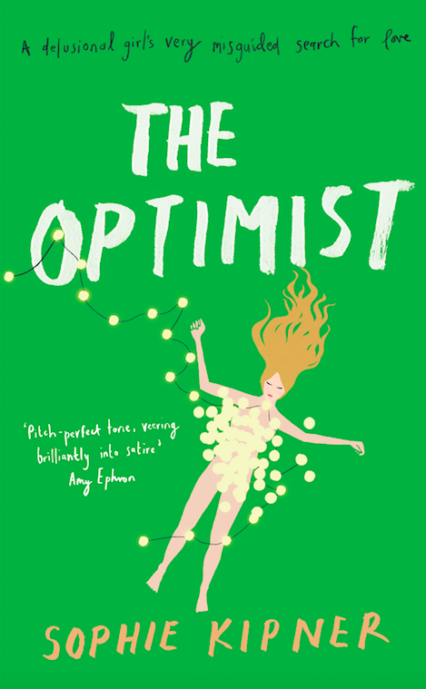Carolyn Percy reviews Sophie Kipner’s The Optimist, a screwball comedy about the quest for true love.
Do you think of yourself as a hopeless romantic? Do you consider yourself to be optimistic? Well, meet Tabitha Gray from Topanga California, who’s sure to have you beat in both categories hands down. Tabitha’s a woman on a mission: to find love. Not just any kind of love however, but the true, romantic, ever-lasting love she knows is just around the corner. But it’s not solely for herself that she’s embarked upon this mad quest; if she can find true love, she can prove to her disillusioned mother and sister that they shouldn’t give up hope.
 Although, so far, she hasn’t been particularly successful. Aggressively optimistic and cheerful to the point of delusion, Tabitha’s intensity often just ends up terrifying the men she pursues. Will she succeed or will her optimism prove to be disastrously unfounded?
Although, so far, she hasn’t been particularly successful. Aggressively optimistic and cheerful to the point of delusion, Tabitha’s intensity often just ends up terrifying the men she pursues. Will she succeed or will her optimism prove to be disastrously unfounded?
There’s, at once, a timeless yet old-timey feel to The Optimist: a melange of wine-soaked evenings, edges softened by cigarette smoke, filled with the sound of old records – a screwball comedy that’s slightly off-kilter. This is echoed – Kipner being a visual artist as well as an author – in her beautifully abstract ink and charcoal illustrations. Stylistically reminiscent of a cross between Picasso and newspaper caricature, they allow us to view the subject as if through the distortion of cracked glass. The core of the novel is simply this: is Tabitha delusional or is she right in that the “choice to believe in love is a necessary pre-condition to being able to love?” It’s an interesting question. Tabitha is obviously not as self-aware as she initially claims to be (of course, if she were, where would be the room for growth?); her obsession with romance and insistence on always looking on the bright side leads her into some eye-wateringly embarrassing situations – from appearing to Harrison Ford in her underwear in a hotel room, to deciding (aged nine) that she is wildly in love with Ernesto the gardener and hiding in his truck to follow him home – with complete disregard as to the consequences for both her and those around her. But despite this, Kipner is not setting up Tabitha for us to mock her. Yes, her exploits serve to satirise the pitfalls and absurdities of the lengths people will go to find love, but – as the success of films such as La La Land have shown us – positivity (even if misplaced) is uplifting in a world that seems to be shifting ever more towards cynicism.
In The Optimist, having been burned one too many times, Tabitha’s mother turns to Dorothy Parker, “the queen of emotional shrewdness”, imparting wisdom that “would stick to my insides like gum, the most glutinous being: “Be the one to love the less.” It might be good advice, if the search for love is robbing you of your self-worth & piece of mind, but Tabitha makes a very perceptive observation:
Dorothy Parker’s words were cutting at us, line by line, and I could see my mom couldn’t stomach the thought that they might be true. She lived by them, but like an atheist who begins to pray when everything is going downhill, she secretly clung to the possibility that Dorothy’s truths were fallible. I think deep down she’d just pretend to disbelieve in love, to be hard and aloof, because the way her eyes lit up with any new prospect.
In criticisms of The Optimist I’m reminded, particularly, of one of the more repeated criticisms brought against The Austen Project (the project of – in celebration of Austen’s bicentenary – having well known authors write modern re-tellings of her novels): that, in transposing Austen’s storylines from the 18th century to the 21st, they would lose some of their narrative impact & significance because ‘marriage doesn’t have the same importance it used to.’ Well, whilst it’s true that marriage isn’t a woman’s only option any more, if it weren’t still important to them would the wedding industry be worth as much as it is? Would shows such as Don’t tell the Bride, Say Yes to the Dress and Bridezillas be as popular as they are? If men and women weren’t still looking for a connection with another person would TV be saturated with Reality dating shows? (I mean, even the 90s had Blind Date, and that’s back now as well.) Wanting to be loved by someone isn’t a uniquely female thing but a fundamentally human one, and even the most independent of us can occasionally feel lonely.
So, is Tabitha deluded? No more so than the rest of us. Like its protagonist, The Optimist is completely bonkers, but in the best way possible.










